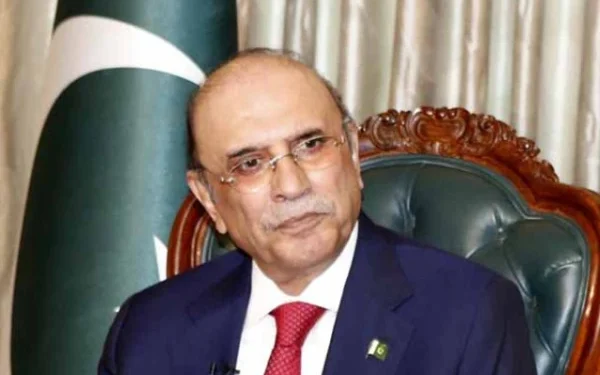Introduction: A Nation in Mourning, a Leader Speaks Out
In the wake of a devastating terrorist attack in the Mastung district of Balochistan, President Asif Ali Zardari has issued a strongly worded condemnation, voicing the sentiments of a grieving nation and reaffirming the state’s unwavering resolve against terrorism. The attack, which targeted Pakistan’s security forces, claimed the lives of three brave servicemen, including Major Muhammad Rizwan Tahir, Naik Ibne Amin, and Lance Naik Muhammad Yunus.
Describing the incident as a “desperate conspiracy by enemy elements,” President Zardari not only honored the supreme sacrifice of the martyrs but also highlighted the professionalism and courage displayed by the security forces during the counter-operation that followed.
The Mastung Attack: Another Tragedy in Balochistan’s Troubled History
What Happened in Mastung?
The incident occurred in the restive Mastung district, located in Balochistan province, an area long plagued by terrorist activities, sectarian violence, and insurgency. According to security reports, militants affiliated with terrorist networks from the Indian subcontinent launched a premeditated attack on a vehicle carrying Pakistani security personnel.
While the terrorists managed to cause casualties, including the martyrdom of three military officials, the security forces responded swiftly and decisively, eliminating several attackers in the counter-assault.
This latest tragedy has once again raised alarms regarding the ongoing threats from India-backed terror proxies operating within Pakistan’s borders.
President Zardari’s Statement: A Condemnation Rooted in National Unity and Resolve
Condemnation of Indian-Backed Terrorism
In his official statement issued from Islamabad, President Zardari squarely blamed enemy elements supported by India, stating:
“This cowardly act is nothing but a desperate conspiracy by anti-state forces from the Indian subcontinent, designed to destabilize Pakistan and shake the morale of its defenders.”
This is not the first time Pakistani leadership has accused India of funding or facilitating terrorism in Pakistan through non-state actors. Over the years, intelligence dossiers and reports submitted to international bodies, including the United Nations and Financial Action Task Force (FATF), have accused Indian intelligence agencies of being involved in subversive operations, particularly in Balochistan and the tribal regions.
Tribute to the Martyrs
President Zardari personally named and paid glowing tribute to the martyred soldiers:
- Major Muhammad Rizwan Tahir
- Naik Ibne Amin
- Lance Naik Muhammad Yunus
He expressed deep grief over the loss, prayed for the elevation of their ranks in Jannah, and extended heartfelt condolences to the bereaved families.
“The entire nation salutes the sacrifices of our brave martyrs. Their names will be etched in the golden history of Pakistan’s struggle for peace.”
Security Forces’ Heroism Lauded by the President
Courageous Counter-Offensive
One of the highlights of President Zardari’s statement was his praise for the prompt and effective response by the security forces during the Mastung attack. He noted that the terrorists were neutralized in a matter of minutes, preventing further casualties and demonstrating the elite training and professionalism of Pakistan’s armed forces.
“The swift counter-attack shows not just the operational capability of our forces, but also the national will to destroy the cancer of terrorism from its roots.”
This sentiment reflects a growing confidence in Pakistan’s military and paramilitary forces, who have undergone decades of conflict training, counter-insurgency operations, and intelligence upgrades to meet modern threats.
National Unity with the Armed Forces
President Zardari reiterated that Pakistan stands united with its security institutions, stating:
“The entire nation stands shoulder to shoulder with its defenders. These attacks may harm individuals, but they can never break our spirit.”
This emphasis on civil-military unity is especially crucial at a time when Pakistan faces multiple internal and external security challenges. From cross-border terrorism to hybrid warfare, the resilience of state institutions and national cohesion remains vital.
Background: Why Mastung and Balochistan Remain Targets
Geopolitical Significance of Balochistan
Balochistan, despite being Pakistan’s largest province by area, remains one of its most underdeveloped and conflict-ridden regions. Its strategic location bordering Iran and Afghanistan, as well as housing the Gwadar Port – the centerpiece of the China-Pakistan Economic Corridor (CPEC), makes it a target for both internal insurgents and external adversaries.
India’s Alleged Involvement
Pakistan has consistently accused Indian intelligence agency RAW (Research and Analysis Wing) of backing Baloch insurgents and militant proxies to undermine stability and derail economic projects like CPEC.
The arrest of Kulbhushan Jadhav, an Indian naval officer and alleged RAW operative captured in Balochistan in 2016, has served as a cornerstone of Pakistan’s narrative about Indian-sponsored terrorism on its soil.
President Zardari’s remarks appear to reaffirm that India remains a strategic threat, not only through conventional means but via asymmetric warfare and terror funding.
Remembering the Martyrs: Their Lives, Sacrifices, and Legacy
Profiles of the Fallen Heroes
- Major Muhammad Rizwan Tahir – A decorated officer known for his leadership and valor. He had previously served in multiple conflict zones and was regarded as a role model for junior officers.
- Naik Ibne Amin – A seasoned soldier from Khyber Pakhtunkhwa who had participated in operations during Operation Radd-ul-Fasaad. He was known among his peers for his discipline and courage.
- Lance Naik Muhammad Yunus – The youngest among the martyrs, Lance Naik Yunus had recently received a commendation for bravery during a high-risk intelligence operation.
Their sacrifice serves as a reminder of the human cost of war, and the burden borne by military families who stand behind every soldier.
Pakistan’s Commitment to Defeating Terrorism
No Compromise on Sovereignty
President Zardari left no ambiguity in his declaration that Pakistan will never compromise on its sovereignty or security. He warned that:
“All terrorist elements – foreign or domestic – will be rooted out. Our soil will not be allowed to become a battlefield for foreign proxies.”
His words align with the government’s broader national security policy, which emphasizes a whole-of-nation approach, combining military, diplomatic, and socio-economic tools to combat extremism.
Support for Military Operations
Since 2004, Pakistan’s armed forces have conducted over a dozen major counter-terrorism operations, including:
- Operation Zarb-e-Azb (2014-2017)
- Operation Radd-ul-Fasaad (2017-present)
These campaigns have dismantled hundreds of terror networks and restored relative peace to regions like Swat, North Waziristan, and Balochistan.
Conclusion: A United Stand Against a Common Enemy
President Asif Ali Zardari’s powerful condemnation of the Mastung terrorist attack is more than just a political statement – it is a message to the world that Pakistan remains unshaken in its commitment to peace, security, and sovereignty.
The martyrdom of Major Rizwan Tahir, Naik Ibne Amin, and Lance Naik Muhammad Yunus is not in vain. Their legacy strengthens the spine of the Pakistani nation and its armed forces, reminding both allies and adversaries that the spirit of resistance lives on.
As Pakistan continues to battle terrorism on multiple fronts, national unity, military professionalism, and political will remain the pillars upon which its future peace depends.
























